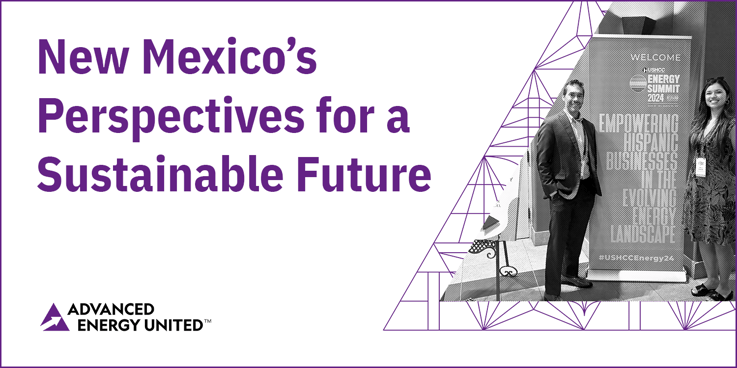
It's important that all stakeholders are included in the clean energy transition, bringing diverse perspectives to address challenges and opportunities. And, when we are given a platform to speak, it’s crucial that we are intentional about the conversations we have.
My colleague Verna Mandez and I had the opportunity to participate in this year's U.S. Hispanic Chamber of Commerce (USHCC) Energy Summit in Santa Fe, New Mexico. As a proud native New Mexican, I was thrilled to have the USHCC in my home state because Hispanics are integral to the state’s economy and a successful energy transition. The Hispanic population is not only growing rapidly but also represents a significant portion of the economy, with a market share value that cannot be overlooked.
This summit offered us a chance to lead and participate in discussions in the state that previously lacked Hispanic representation and visibility. Our active participation in these conversations will play a key role in shaping the energy landscape in New Mexico.
New Mexico has long relied on oil and gas to fuel its economy. As a result, a substantial number of New Mexicans live within half a mile of active oil and gas operations, leading to negative impacts on health and quality of life. Transitioning to 100% clean energy is not easy, but it is essential for the health and well-being of all New Mexicans. It demands a collaborative, holistic, and pragmatic approach.
This conference brought industry leaders together and underscored the significant role Hispanic communities play in the energy transition. In 2022, New Mexico's clean energy workforce included 12,686 workers, with substantial growth observed across various sectors such as renewable generation, energy efficiency, and grid modernization. Notably, New Mexico had the highest percentage of Hispanics or Latinos of all U.S. states, with 50% of its population identifying as Hispanic or Latino in 2021, over 2.5 times higher than the national average of 18.8%. This demographic prominence reinforces the vital contributions of Hispanic workers in advancing the state’s renewable energy initiatives and underscores the importance of inclusive participation in the broader clean energy landscape.
Companies like Avangrid, Chevron, Toyota North America, Shell, Blue Wave, HOPPECKE Batteries, and JP Morgan Chase participated during the conference in discussions around strategic alliances, innovative fuel and engine technologies, energy diversity, sustainability, methane emission reduction, carbon capture advancements, and equitable energy systems. These discussions underscored the importance of our involvement in advocating for 100% clean energy policy, promoting sustainable futures, and driving technological advancements in the energy sector.
 The panelists of the conference's “Bridge Policy for Cross-Sector Collaboration" panel, which focused on collaboration across the energy industry to drive economic growth. Pictured left to right: Michael Barrio of Advanced Energy United, Robert Sachs of Sigma Advanced Technologies, Matthew Jaramillo of ExxonMobil, Kenneth Armijo of Sandia National Laboratories, and Josue Chavez of HOPPECKE Batteries Inc.
The panelists of the conference's “Bridge Policy for Cross-Sector Collaboration" panel, which focused on collaboration across the energy industry to drive economic growth. Pictured left to right: Michael Barrio of Advanced Energy United, Robert Sachs of Sigma Advanced Technologies, Matthew Jaramillo of ExxonMobil, Kenneth Armijo of Sandia National Laboratories, and Josue Chavez of HOPPECKE Batteries Inc.
During the summit, I moderated a panel and led a roundtable discussion on adopting a 'linked arms' approach to achieve a swift and pragmatic energy transition. In our conversations, we identified opportunities to go deeper into two key areas:
- Reducing New Mexico’s reliance on oil and gas: While oil and gas have historically provided for the state, they have also adversely impacted our health and environment. Industry experts and state officials alike agree that reliance on a limited array of finite resources puts the state’s well-being and economy in jeopardy. Diversifying our energy portfolio away from a reliance on fossil fuels is also essential for energy independence and security.
- Addressing environmental and community impacts: The impact of oil and gas on New Mexico’s environment and communities is significant. It's crucial to acknowledge these impacts and work towards solutions that benefit both the environment and the people.
If we can learn to collaborate on solutions rather than focusing on differences in philosophy, we can do serious work to support and accelerate the deployment of renewable energy technologies, enhance energy efficiency, and reduce greenhouse gas emissions while also ensuring energy security and economic stability during the transition period. In addition to leveraging the federal funding from the Inflation Reduction Act (IRA) and Infrastructure Investment and Jobs Act (IIJA), New Mexico’s geothermal energy is particularly promising, potentially providing a natural transition for the workforce currently employed in the oil and gas sectors with transferrable skills. This effort will create jobs, foster affordable energy solutions, and ensure New Mexicans are not left behind in the transition.
We must commit to collaborating on well-defined policy initiatives aimed at facilitating the shift from traditional, fossil fuel-based energy systems to a sustainable, renewable energy future. Working together to address these challenges is essential to achieve a successful transition. It’s essential to work together across sectors and communities to ensure a sustainable and inclusive energy future. Let’s take this opportunity to pave the way for a more resilient and cleaner energy landscape in New Mexico and beyond.